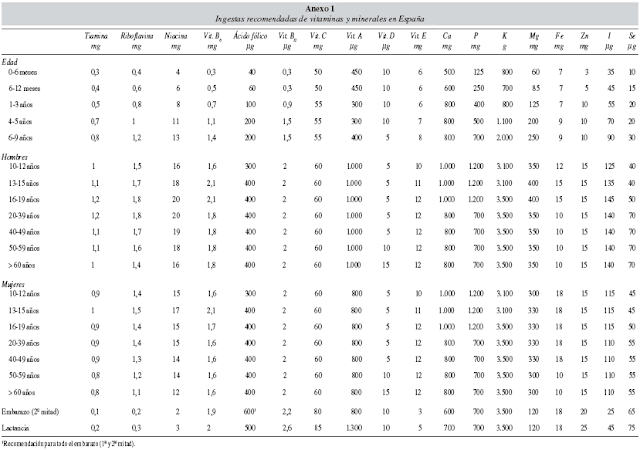Si hay un mito extendido por excelencia entre hombres y mujeres de todas las generaciones es la idea de que " las vitaminas engordan".
Día a día en la Farmacia y especialmente a partir de la primavera ante la llegada de la temida "astenia", el cansancio, la fatiga son protagonistas del día a día de mis pacientes. Cuando me comentan dicha situación y a algunos les recomiendo "Vitaminas", el pavor se apodera de sus caras, y acaban confesándote el motivo... "Es que no quiero engordar", "Me han dicho que las vitaminas aumentan el apetito". Otros simplemente me consultan y preguntan por algunas " vitaminas que no engorden".
El estrés, el trabajo,los estudios, los problemas o preocupaciones personales, el ritmo frenético sobre todo de las ciudades hacen que en determinados momentos nuestro cuerpo nos exija más, o simplemente debido a todo lo anterior nuestra alimentación empeora, comemos cualquier cosa a cualquier hora, perdemos la noción de los horarios de nuestra alimentación... Es entonces cuando debemos tomar medidas, frenar y reconducir nuestra conducta, comer y organizarnos mejor, y suplementar nuestra alimentación con vitaminas.
El estrés, el trabajo,los estudios, los problemas o preocupaciones personales, el ritmo frenético sobre todo de las ciudades hacen que en determinados momentos nuestro cuerpo nos exija más, o simplemente debido a todo lo anterior nuestra alimentación empeora, comemos cualquier cosa a cualquier hora, perdemos la noción de los horarios de nuestra alimentación... Es entonces cuando debemos tomar medidas, frenar y reconducir nuestra conducta, comer y organizarnos mejor, y suplementar nuestra alimentación con vitaminas.
Las "vitaminas" como su propio nombre indica, son sustancias imprescindibles para la "vita" (la vida) Son imprescindibles para el crecimiento y desarrollo de nuestro cuerpo y de nuestras funciones vitales. La falta de una de estas "vitaminas" ocasiona un trastorno o enfermedad a las personas (Escorbuto, Beri-beri, Pelagra...)
En un primer momento se determinaron las cantidades / ingestas mínimas recomendadas para prevenir estas deficiencias, sin embargo hoy en día, las recomendaciones dietéticas sobre las vitaminas van más allá, no sólo tratan de evitar enfermedades, si no de prevenirlas y mejorar nuestra calidad de vida.
En un primer momento se determinaron las cantidades / ingestas mínimas recomendadas para prevenir estas deficiencias, sin embargo hoy en día, las recomendaciones dietéticas sobre las vitaminas van más allá, no sólo tratan de evitar enfermedades, si no de prevenirlas y mejorar nuestra calidad de vida.
 |
| Recomendaciones Nutricionales de la OMS |
¿Por qué decimos que las "vitaminas" engordan? ¿ Es cierto?
Cuando tenemos un déficit o nivel bajo de vitaminas, nos encontramos cansados, nuestro rendimiento disminuye, nos fatigamos rápidamente, e incluso nos convertimos en inapetentes.
Hay personas que dejan de tener ganas de comer, en estos casos, en cuanto se recuperan los niveles normales, y nos empezamos a encontrar físicamente bien, el apetito vuelve a aparecer. Pero no aparece en mayor medida que antes ni aumenta si nunca habías perdido el apetito.
Las vitaminas no te hacen engordar, no te aportan kilocalorías extras, no abren el apetito. Sólo te ayudan a estar al 100% físicamente, mejorar tu rendimiento y a tener mejor calidad de vida.
Es más, tomar vitaminas puede ayudarte en dietas de adelgazamiento a mejorar tu estado anímico y físico motivándote a hacer más deporte y conseguir perder más peso.
¿Es necesario siempre suplementar tu alimentación con "Vitaminas"?
Cuando llevas una alimentación equilibrada y variada, no hay porqué suplementar la dieta con vitaminas porque las tomas en la comida:
Vitamina B1 o Tiamina: Carne, hígado, huevos, cereales integrales y legumbres.
Vitamina B2 o Rivoflavina: Carne, hígado, huevos, cereales integrales y legumbres.
Vitamina B3 o Niacina: Carne, huevos, pescado, legumbres.
Vitamina B5 o Ácido Pantoténico: Carne, huevos, pescados, frutos secos, cereales integrales y legumbres.
Vitamina B6 o Piridoxina: Carne, hígado, pescado, frutos secos y legumbres.
Vitamina B12 o Cobalamina: Carne, Hígado,Pescado azul, lácteos y huevos.
Ácido Fólico: Carne, hígado, espárragos, espinacas, guisantes...
Vitamina C: Fresas, cítricos (limón, naranja, mandarina, lima), kiwi y tomate crudo.
Vitamina A: Hígado, Leche, Zanahoria, espinacas, aceite de hígado de bacalao.
Vitamina D: Pescado azul y huevos.
Vitamina E: Aceite de oliva, huevos, semillas...
Vitamina K: Vegetales de color verde intenso ( espinacas, acelgas...), la col, la coliflor...
Pero cuando hay una situación especial en la que no llevamos una alimentación equilibrada, dietas muy hipocalóricas con riesgo de déficit de vitaminas, dietas vegetarianas estrictas, o situaciones especiales en las que tu cuerpo necesita un "extra": periodo de exámenes, práctica de mucho ejercicio físico... "Es mejor prevenir que curar", y por ello recomiendo tomar vitaminas.
Referencias:
"Vitaminas" A.I de Cos Blanco, G.Riesgo Eizaguirre, A.López Guzmán, M. Gargallo Fernández.
There is a myth spread among men and women of all generations. That idea is that "vitamins get us fat".
Day by day in the Pharmacy, especially since the spring, before the arrival of the feared "asthenia" exhaustion, fatigue have a main role every day in my patients. When I discussed this situation and I recommend "Vitamins", the fear takes over their faces, and they end up confessing the reason ... "I do not want to get fat", "I'm told that vitamins increase appetite". Others simply consult and ask me for some "vitamins that do not get fat".
Stress, work, school, personal problems or concerns, the frenetic pace of the city especially at certain times make our body requires more, or simply due to the above we eat anything at any time, we lose track of the hours of our food... That's when we should take action, stop and redirect our behavior, eating and better organized, and supplement our diet with vitamins.
Day by day in the Pharmacy, especially since the spring, before the arrival of the feared "asthenia" exhaustion, fatigue have a main role every day in my patients. When I discussed this situation and I recommend "Vitamins", the fear takes over their faces, and they end up confessing the reason ... "I do not want to get fat", "I'm told that vitamins increase appetite". Others simply consult and ask me for some "vitamins that do not get fat".
Stress, work, school, personal problems or concerns, the frenetic pace of the city especially at certain times make our body requires more, or simply due to the above we eat anything at any time, we lose track of the hours of our food... That's when we should take action, stop and redirect our behavior, eating and better organized, and supplement our diet with vitamins.
The "vitamins" as the name implies, are substances essential for the "vita" (life) are essential for the growth and development of our body and of our vital functions. The lack of one of these "vitamins" can end in a disorder or disease (Scurvy, Beri-beri, pellagra ...)
At first, it was determined the amounts / minimum recommended intakes to prevent these deficiencies, however today, the dietary vitamins recommendations go beyond, not only try to avoid illness, if not to prevent and improve our quality of life .
At first, it was determined the amounts / minimum recommended intakes to prevent these deficiencies, however today, the dietary vitamins recommendations go beyond, not only try to avoid illness, if not to prevent and improve our quality of life .
 |
| WHO Nutrition Recommendations |
Why do we say that the "vitamins" get us fat? Is it true?
Cuando tenemos un déficit o nivel bajo de vitaminas, nos encontramos cansados, nuestro rendimiento disminuye, nos fatigamos rápidamente, e incluso nos convertimos en inapetentes.
When we have a deficit or low level of vitamins, we are tired, our performance declines, we get fatigued quickly and even we become unappetizing.
Some people stop wanting to eat, in these cases, as they recover normal levels, and they start to find themselves physically well, the appetite reappears. But not in a greater degree than before and it does not increase if you've never lost my appetite.
Vitamins will not make you fat, will not provide extra calories, will not open the appetite. Only will help you to be 100% physically, improve your performance and to have better quality of life.
Moreover, taking vitamins can help in slimming diets to improve your mood and motivating physical exercise so you lose more weight.
Is it always necessary supplement your diet with "Vitamins"?
When you follow a balanced and varied diet, there is no reason to supplement the diet with vitamins because you eat with the food:
Vitamin B1 or Thiamine: Meat, liver, eggs, whole grains and legumes.
Vitamin B2 or Riboflavin: Meat, liver, eggs, whole grains and legumes.
Vitamin B3 or Niacin: Meat, eggs, fish, legumes.
Vitamin B5 or Pantothenic Acid: Meat, eggs, fish, nuts, whole grains and legumes.
Vitamin B6 or Pyridoxine: Meat, liver, fish, nuts and legumes.
Vitamin B12 or cobalamin: Meat, Liver, oily fish, dairy and eggs.
Folic Acid: Meat, liver, asparagus, spinach, peas ...
Vitamin C: Strawberries, citrus (lemon, orange, mandarin, lime), kiwi and raw tomato.
Vitamin A: liver, milk, carrot, spinach, cod liver oil.
Vitamin D: Oily fish and eggs.
Vitamin E: Olive oil, eggs, seeds ...
Vitamin K: dark green vegetables (spinach, chard ...), cabbage, cauliflower ...
When there is a special situation in which we are not eating a balanced diet, very low calorie diets with vitamin deficiency risk, strict vegetarian diets, or special situations in which your body needs an "extra": exams period, practice much physical exercise ... "Prevention is better than cure", and therefore I recommend taking vitamins.
References:
"Vitaminas" A.I de Cos Blanco, G.Riesgo Eizaguirre, A.López Guzmán, M. Gargallo Fernández.




No hay comentarios:
Publicar un comentario